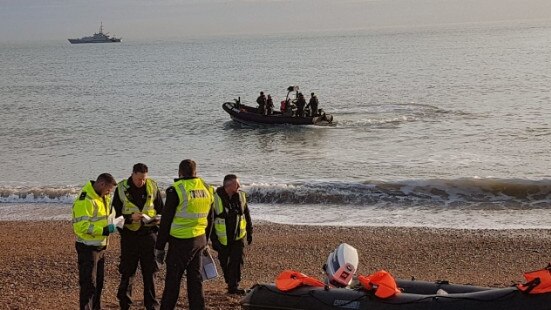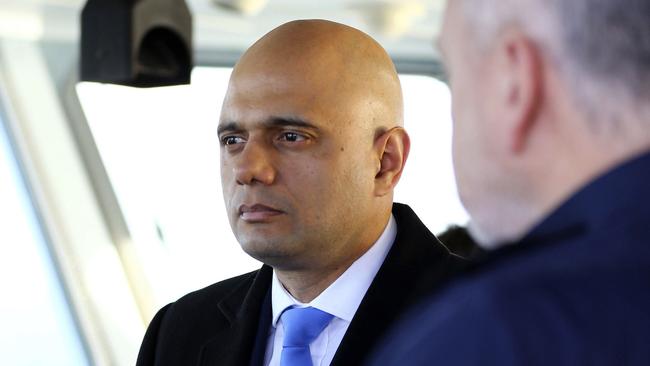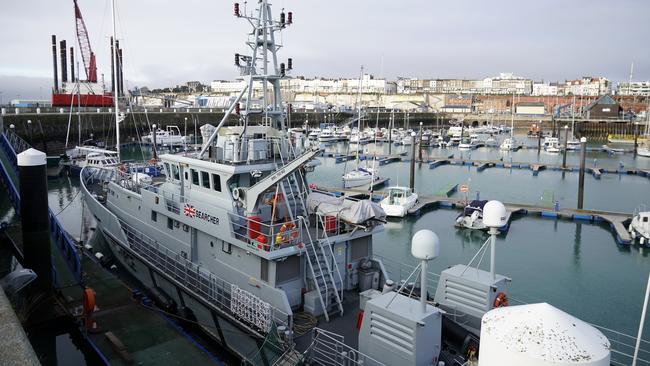Britain battles to shore up borders
The boats are arriving ... and Theresa May’s government is taking its cue from Australia’s successful border policies.

The boats are arriving. Some are making it to shore, others intercepted at sea. The asylum-seekers are paying the equivalent of tens of thousands of dollars to people-smugglers. Once ashore, arrivals are cared for and processed.
Some citizens welcome them, claiming to understand their plight; others accuse them of abusing the generosity of a First World nation and argue that “queue-jumpers” should be turned back.
This is Britain, now. Spurred on by the looming implementation of Brexit — which despite the political shambles remains slotted for March 29 — boatloads of asylum-seekers are crossing the English Channel in a kind of small-scale Dunkirk evacuation in reverse.
The numbers are relatively small for now; 239 people have made the journey since November, including 40 people on five boats on Christmas Day and 12 who were discovered this week after making landfall at Greatstone, Kent, in a dinghy.
Yet this is a dramatic upsurge in recent months. French police disrupted a group of 14, claiming to be from Iraq, allegedly attempting to steal a fishing trawler this week to make the journey.
British Home Secretary Sajid Javid has recalled two Border Force vessels from the Mediterranean to patrol the channel.
This saga and the debate around it are eerily familiar to Australians. And they underscore the grave risks for this nation if we relent in our tough border protection policies again, as we did under Labor in 2008, with tragic and costly consequences.
Most of the British boat arrivals have been Iranian, a cohort often described as economic migrants rather than refugees. (Even former Labor foreign minister Bob Carr came to this conclusion here.) All have set sail from France which, of course, is a party to the UN Convention on Refugees. On this basis alone, Britain should be wise enough to turn boats back. Typically, it doesn’t — instead using its vessels to bring asylum-seekers ashore, sparking debate about whether increased patrols and so-called “rescues” increase the incentive for boatpeople.
Though short, the 35km channel crossing is dangerous because it traverses one of the world’s busiest shipping lanes and the weather can be treacherous. Dozens are believed to have made the crossing and disappeared into the English countryside without detection, while about 40 per cent of all attempts have been thwarted by French patrols.
The Brits clearly have not learned the lessons from Australia. The Tory government has spoken about increased Middle East strife contributing to the surge — redolent of the notorious “push factors” excuse once proffered by Labor here and echoed uncritically by so many commentators. “The reasons behind the increased crossings are complicated and, in many cases, outside of our control,” the Home Secretary said this week.
“We will do everything we can to make sure it is not a success, in the sense that I don’t want people to think that if they leave a safe country like France they can get to Britain and then just get to stay,” Javid said.
“That’s why I am working out ways with the French to increase the number of returns that we can make to also send a very strong message that we will do all we can, not just to protect human lives — of course that’s the right and responsible thing to do at all times — but also to protect our borders.”

Note Javid does not talk about turning boats back but asks France to accept more returns. Decisiveness, clarity and resolve are crucial. I hope Britain doesn’t have to find out the hard way.
Migration was at the heart of the Brexit referendum result, with Brits keen to restore sovereign rights to their immigration system after Europe surrendered control of its borders. Javid recognised this in a speech last month that echoed the famous words of John Howard in 2001. The Home Secretary said that when Brexit was formalised “we can end free movement” and that “for the first time in more than 40 years, we will be able to say who can, and who cannot, come to this country”. That decisiveness has gone missing for now and the Brits soon may discover that firm words are meaningless without strong action and clear resolve.
Which brings us back to Australia, where the Coalition government this week closed another detention centre at Maribyrnong, taking the total shut down to 19 — Labor opened and filled detention centres in every state, and two offshore, last time it was in government. Under the Coalition the one-way traffic has been all in the other direction, emptying and closing detention centres. Judged by the emotive and sanctimonious rhetoric we hear from Labor, the Greens, church groups and the love media, you would think these facts were the mirror opposite.
This week two high-profile priests, Catholic charity worker Father Bob Maguire and Anglican political activist Father Rod Bower, indulged comparisons between Australia’s Manus Island detention facility and Auschwitz.
“Manus is how the Holocaust started,” Bower’s notorious church-front protest sign screamed, sparking condemnation from Jewish community leaders, government ministers and appalled citizens. In the social media debate that followed this factually absurd and morally odious analogy, the priests were supported by leftist journalists such as Mike Carlton, union leaders such as Sally McManus and Labor politicians such as Kristina Keneally and Brian Mitchell.
This sort of fact-averse virtue-signalling from the Left only heightens fears about what would happen to our borders under a Shorten Labor government. Just as it did in 2007, Labor is promising to maintain secure borders but add a dollop of compassion — a recipe that proved disastrous.
Bill Shorten claimed victory at last month’s ALP convention because he (narrowly) defeated moves to amend official policy to reject boat turnbacks — a crucial operational tool that Labor refused to use in government, claiming it could never work and would trigger conflict with Indonesia.
Instead, the conference vowed to boost the refugee intake by another 5000 people on top of an earlier goal to raise the annual total to 27,000 — taking it to more than 15 per cent of our total immigration intake.

Labor promises to scrap temporary protection visas and effectively neuter offshore processing by allowing refugees to be brought to Australia so long as two doctors recommend it. (Why not make it two priests?) So, for secure borders a Shorten Labor government would rely on the boat turnbacks it rejected last time it was in power and that much of its party, including many MPs, oppose on moral, legal and diplomatic grounds.
Try to imagine the resolve, or lack of it, we would see from Labor the first time a boat is intercepted and the occupants threaten to sink unless they are taken to Australia.
Scott Morrison (who was immigration minister under Tony Abbott), Home Affairs Minister Peter Dutton and senator Jim Molan, who was the architect of Operation Sovereign Borders, know how difficult this policy is to implement. They know the tough decisions that must be made to prevent tens of thousands of people going into detention and/or hundreds more dying at sea.
Molan spoke about this challenge this week, lamenting how Europe had yet to make the fundamental decision to “control their borders”, the British government was sounding “confused”, and the ALP still was showing a lack of understanding.
He spoke about the need to take responsibility for the consequences of actions, which sometimes can be “bodies floating in the water face down at sea”.
It is worth quoting Molan on how to find the inner resolve to deal with the operational decisions involved: “It’s a very, very demanding moral problem and those that are going to be responsible for life — and I’ve had 40 years in the military, I’ve made moral decisions which are life-and-death decisions on any number of occasions — you’ve got to get your moral framework right, you’ve to occupy the moral high ground and once you’ve got that, and once you know that you are not breaking international law and you are a compassionate nation, then you act in the interests of both the people who are being smuggled and your own nation.”
This points to the core dilemma for Labor, this nation and the hapless potential customers of people-smugglers — no matter what a Shorten government says on this issue, it is its actions that will matter. Labor somehow will have to implement a policy that it has decried on moral, humanitarian, diplomatic, legal and political grounds for decades. All the while it will have to weather vicious criticism from far-left activists, churches, international organisations, some of its own MPs and the Greens MPs on whose votes it will rely in the Senate. Good luck.




To join the conversation, please log in. Don't have an account? Register
Join the conversation, you are commenting as Logout